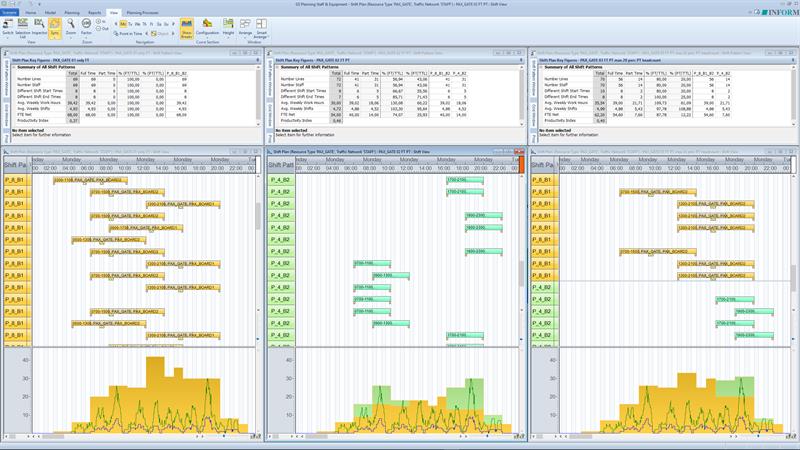
INFORM’s pioneering software solution, GroundStar, has played an integral role in planning work rosters and GSE requirements for airlines and ground handlers during the pandemic, according to Senior Vice President Aviation, Uschi Schulte-Sasse.
“The software system allows airlines and handlers to carry out what-if scenarios, which is invaluable when you have to adapt to flight disruptions at short notice and to daily changes in travel regulations that have an impact on resource requirements,” Schulte-Sasse explained.
“When people needed to be put on furlough, companies had to look at qualifications of people who were imperative to be kept or where there were opportunities to cross-train staff. GroundStar assisted in this process and helped companies to analyse their planning scenarios, see what would work in real-life and make financial decisions accordingly.”
Another positive aspect about GroundStar during the Covid-19 crisis was that it allowed airlines and ground handlers to carry out contact tracing.
“This helped plan the safety of ground handling staff already when organising staff rosters. Also, if someone became infected with Covid, GroundStar could not only tell you which group of colleagues the infected person worked with, but in addition what flights they worked on and other staff that they were potentially in contact with at the aircraft.
“At the beginning of the pandemic when someone was ill, you sent the whole shift home, sometimes leaving you without the required minimum of staff. Now you have the competency and knowledge to not send everyone home for quarantine. With GroundStar, you can check who was or wasn’t in contact with an infected person so that you can manage your quarantine processes more adequately,” she said.
Planning Staff and Equipment is one facet of GroundStar (GS) software (GS Planning Staff & Equipment) which includes a real-time version, GS RealTime Staff & Equipment. Other modules include Planning Stands and Terminal resources (GS Planning Stands & Terminals), such as check-in counters, baggage belts and passenger gates, also available in real-time mode (GS RealTime Stands & Terminals); there is GS WorkforcePlus for staff scheduling; GS Connect, managing the overall passenger and baggage connection process, GS TurnManager for hub and turnaround management; GS GroundFleet, a GSE and telematic monitoring tool, and GS BIS, a Business Intelligence System, which includes reporting on operational and historical data, online dashboards with drill-down capability, and data exploration in management cockpits.

“GroundStar is a comprehensive solution in the area of ground handling, whether you are an airline or airport doing the ground handling, an independent ground handler or a special service provider like catering, cleaning, fuelling or PRM services. The whole set up is there,” said Schulte-Sasse.
Since GroundStar’s introduction in the 1990s there have been more than 200 installations worldwide and the feedback from customers has always been positive.
“They value GroundStar immensely,” she explained. “We offer a combination of a very good system and a team of very qualified experts. A customer told us the reason why they selected INFORM was because we have the best system and best people, and the combination really convinced them.”
Schulte-Sasse has been with the business since the late 1980s when she started in the logistics division before INFORM founded the aviation division a couple of years later.
“We started our first aviation project in 1990 and since then, we have been continually improving, developing, and adding new features and modules to our GroundStar solution,” she said.
Sustainability
She says that Covid-19 has further opened the eyes of the aviation ground handling world to the importance of sustainability, an issue close to her heart.
“We want our systems to be the lever that airports, ground handlers and airlines have in order to fulfil their sustainability goals. Sustainability goals that comprise more than just the ecological aspects like having reduced idle times and less empty travel distances but also topics like prevention of waste and moreover recognising the workforce and their well-being. Nowadays, there is more awareness of staff needs and to combine that with the demands of the operation ensures the best possible outcome for everyone. With our systems staff can enter their shift preferences and request an individual schedule which will be matched and granted against the operation demand as far as possible.
“With the shortage of human resources at the moment in the industry, it’s imperative to create an attractive working environment to make people want to come back to aviation,” she said.
Hope for the future?
“From my perspective the aviation business will always be in demand. People need and want to fly to other countries whether for business or leisure. Currently each region in the world is recovering at different rates, with some further ahead than others. In November 2021, the volume for the 10-day Thanksgiving travel period in the US was 20.9 million, about 89% of pre-pandemic travel numbers, the US Transportation Security Administration (TSA) stated, and more than twice the volume over 2020. It is very different across the world, with the impact of Omicron now causing more disruption, this will again change the dynamics of recovery for each region.
“On a more positive note, the aviation industry has always come out of a crisis in a better shape. In that sense, we will also not let this crisis go to waste. At INFORM, we have gone above and beyond to help our customers during this difficult period, for example, through free planning and rostering support. Also, because of Covid there has been a massive leap in digitalisation and a rethinking of processes in a much more radical way than before, all of which will help us come out fitter as an industry in the future,” she added.





